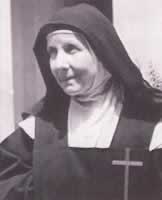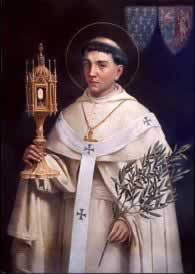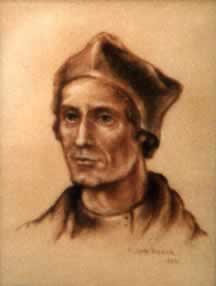June Saints
(1080-1134)
Born at Xanten, Cleves, Norbert became a subdeacon and canon but led a worldly life at court. Having undergone a complete conversion in 1115, he set about trying to reform his fellow canons, who took umbrage at his efforts. He resigned his office and obtained from the Pope permission to preach anywhere he wished.
He took to itinerant preaching throughout northern France, soon earning a reputation for eloquence and miracles. Having been given some land, he and thirteen followers established the Order of the Premonstratensians under the Augustinian Rule. Named Archbishop of Magdeburg in 1126, he brought his reforming zeal to the see, surviving several assassination attempts. Named Chancellor of Italy in 1134, he died of exhaustion shortly afterwards.
Saint Norbert, teach us zeal and patience in the exercise of our vocation.
(Source: OSV encyclopedia of saints. Matthew, Margaret & Stephen Bunson. Our Sunday Visitor, Huntington, Indiana. 2003)
 Blessed Maria Candida of the Eucharist
Blessed Maria Candida of the Eucharist
(1884-1949)
Born Maria Barba in January 1884, Maria was the daughter of an appellate judge in Palermo, Italy. Her family was deeply religious and the little girl, from a very early age, demonstrated an extraordinary love for the Eucharist. “When I was still a child, and before I was old enough to receive Jesus in Communion, I used to rush to the front door to greet my mother when she returned from Mass. There I stood on tiptoe to reach up to her and cried, ‘I want God, too.’” From the age of ten, when she made her first Holy Communion, her great joy was to be able to receive Jesus. From then on, deprivation of the sacrament was for her a great and painful cross.
At fifteen, Maria felt called to religious life, but her family strongly opposed this and she had to wait twenty years, during which she suffered interiorly but remained true to her vocation. During this time she was sustained by her special devotion to the Eucharist. In 1919, she entered the Teresian Carmel in Ragusa, taking the name Maria Candida of the Eucharist. She said she wanted “to keep Jesus company in the Eucharist for as long as possible.” Her special devotion, and the fundamental effect it had on her spiritual relationship with God, gave her the strength to consecrate herself as a victim to God in 1927.
From 1924 to 1947, Maria served as Prioress of her community, acquiring from the Eucharist a deep understanding of the three religious vows. She established among her Sisters a profound love for the Rule of St Teresa of Jesus, and was directly responsible for the expansion of Carmel in Sicily. She saw all dimensions of Christian life summed up in the Eucharist. For Mother Candida, the Eucharist was a school, it was food and an encounter with God, a coming together of hearts, a school of virtue and wisdom. “Heaven itself does not contain more. God, that unique treasure, is here! Really, yes, really: my God is my everything. I ask my Jesus to be a guardian of all the tabernacles of the world until the end of time.”
After she endured months of painful suffering from liver cancer, the Lord called Mother Maria Candida to himself on 12 June 1949, the feast of the Most Holy Trinity.
Blessed Maria, obtain for us a true devotion to the Holy Eucharist.
(Source: Internet – various)
John Fisher was born in Yorkshire, England, and ordained at Cambridge at the age of 22, becoming vice-chancellor in 1501. Having served as chaplain to Lady Margaret Beaufort, he returned to Cambridge as chancellor. Appointed Bishop of Rochester, John became famous for his writings, including his efforts to resist the spread of Protestantism. Among his notable works was a defence of the Real Presence in the Eucharist.
In 1529, he was named a counsellor to Queen Catherine of Aragon, leading the opposition to King Henry VIII’s divorce from her. Twice imprisoned for opposing the king, he refused to sign Henry’s Act of Supremacy in 1534. He was placed in the Tower of London, and Pope Paul III made him a Cardinal, largely as a gesture of support. Bishop John faced a trial after ten difficult months in the Tower and was condemned and beheaded. A gifted theologian and scholar, he was an inspiration to the leaders of the Catholic Reformation, and his writings were used at the Council of Trent.
Saint John, give us the courage to stand up for the truth.


 Entries(RSS)
Entries(RSS)